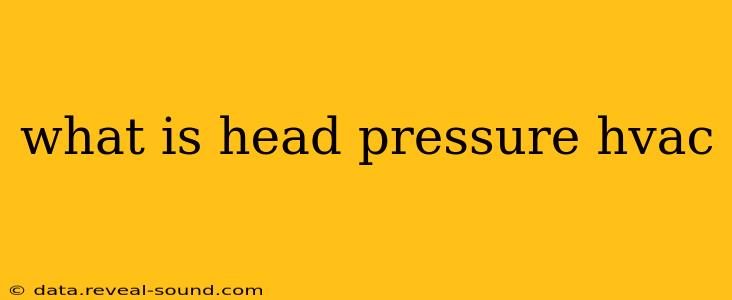Head pressure, in the context of HVAC (Heating, Ventilation, and Air Conditioning) systems, refers to the pressure of the refrigerant in the high-pressure side of the refrigeration cycle. This is the side of the system after the refrigerant has been compressed and before it enters the condenser. Understanding head pressure is crucial for diagnosing and maintaining the efficient operation of your HVAC system. High or low head pressure can indicate serious problems that need immediate attention.
What Causes High Head Pressure in an HVAC System?
High head pressure is a common issue that can stem from several factors:
-
Overcharged Refrigerant: Too much refrigerant in the system increases the pressure. This is a frequent cause and often a result of improper installation or servicing.
-
Restricted Airflow: Obstructions in the condenser coils (like debris, leaves, or even ice buildup) prevent efficient heat dissipation, leading to increased pressure. Regular cleaning and maintenance can mitigate this.
-
Faulty Condenser Fan Motor: A malfunctioning fan motor fails to adequately draw air across the condenser coils, again hindering heat dissipation and increasing pressure.
-
Dirty Condenser Coils: Similar to restricted airflow, dirty coils reduce efficiency and raise head pressure. Regular cleaning is essential for optimal performance.
-
High Ambient Temperature: Extremely hot weather conditions can make it harder for the condenser to reject heat, resulting in higher head pressure. This is often unavoidable, but proper system sizing can help.
-
Refrigerant Restrictions: Problems within the condenser or other components of the high-pressure side can restrict refrigerant flow and increase pressure.
What Causes Low Head Pressure in an HVAC System?
Low head pressure is equally problematic and can be caused by:
-
Undercharged Refrigerant: This is a significant issue, often resulting in poor cooling capacity and potential system damage. Leaks are a major cause of undercharging.
-
Leaking Refrigerant: Leaks in the system allow refrigerant to escape, leading to low pressure. Detecting and repairing leaks is crucial for system functionality.
-
Restricted Refrigerant Flow: Obstructions in the system, such as blockages in the capillary tube or expansion valve, can restrict refrigerant flow.
-
Faulty Compressor: A malfunctioning compressor may not be able to pump refrigerant efficiently, resulting in low pressure.
-
Improper Installation: Incorrect installation of the system can contribute to various pressure problems, including low head pressure.
How is Head Pressure Measured?
Head pressure is measured using gauges connected to the system's service ports. HVAC technicians use manifold gauges, which typically measure pressure in PSI (pounds per square inch). The readings are compared to manufacturer specifications for the specific HVAC system.
What are the Symptoms of High and Low Head Pressure?
Both high and low head pressure manifest in several ways:
-
Poor Cooling or Heating: Inefficient heat transfer directly impacts the system's ability to cool or heat effectively.
-
Compressor Overheating: High head pressure puts excessive strain on the compressor, leading to overheating and potential damage.
-
Reduced Efficiency: Both high and low pressures reduce the system's overall efficiency, leading to higher energy bills.
-
System Shutdowns: In severe cases, the system may automatically shut down to prevent damage.
-
Unusual Noises: The compressor or other components may produce unusual noises when struggling with pressure imbalances.
What Should I Do if I Suspect Head Pressure Problems?
If you suspect issues with head pressure, do not attempt to diagnose or repair the problem yourself. HVAC systems use refrigerants that can be dangerous if handled improperly. Contact a qualified and licensed HVAC technician to inspect and repair your system. They have the necessary tools, training, and expertise to diagnose the problem accurately and safely.
How Often Should I Have My HVAC System Serviced?
Regular maintenance is key to preventing problems related to head pressure and ensuring your system operates efficiently. Annual inspections by a qualified technician are recommended to detect and address potential issues before they become major problems. This proactive approach will extend the life of your system and save you money in the long run.
